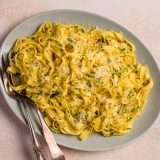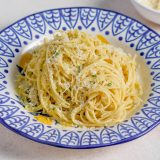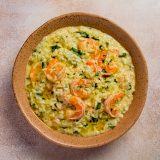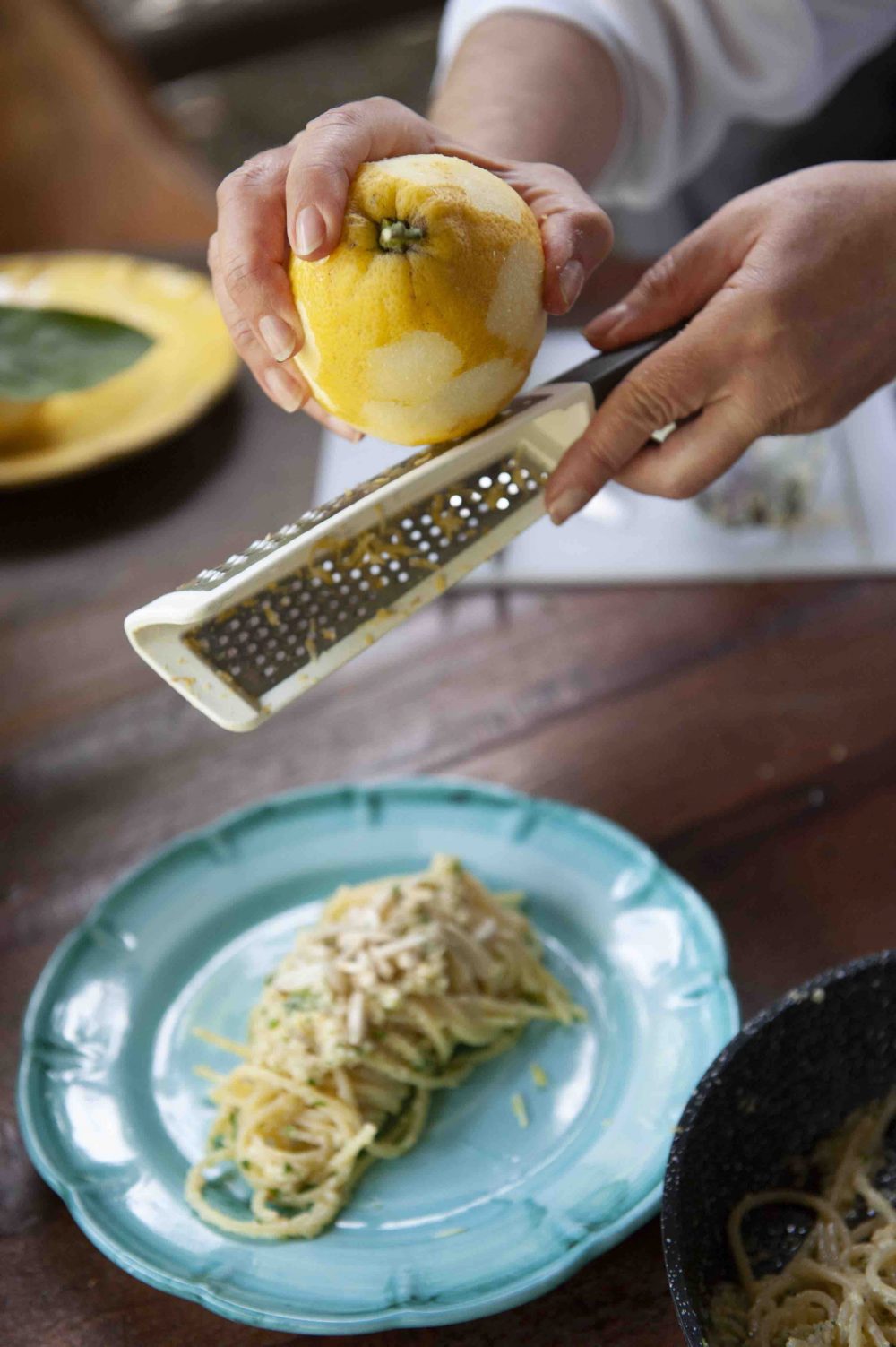
Lemon infuses much of the food of Amalfi.
Lemon infuses much of the food of Amalfi.
There was a time in Amalfi when only the women carried the lemons, hoisting onto their heads 140-pound crates jammed and glowing with softball-sized citrus. Trudging 1,500 steeply terraced steps blanketed green and dotted yellow downward to the Gulf of Salerno, to the markets, to the port, to the limoncello factories, wading through jasmine-scented breezes.
Today, they get help. From the men. From a shaky, 52-year-old cable car. Yet much is unchanged. The lemons—Sfusato Amalfitano, special to the hills of this valley-lodged city along Italy’s western coast—still underpin nearly everything here, infusing the economy, the cuisine, the culture, even the wine, produced from vines that share soil with lemon trees.
For six generations, Salvatore Aceto’s family has grown lemons on these hills, his family arriving from Sicily around 1700. As he leads a strenuous tour of his farm, which steps its way up the hill to overlook the city, he plucks a lemon tenderly from branches supported by a lattice of dried willow branches overhead, the fruit’s skin a gnarl of golden lumps.
“We don’t have blood in the veins,” says Aceto, who gave up a career in business to return to run the farm. “We have lemon juice. Lemons are everything for us.”
In the U.S., lemons too often play too simple a role in our cooking, relegated to sweets or used as a simple acid that brightens but rarely brings full force of flavor. I’d reached out to Aceto because in Amalfi cooks understand the transformative power of this simple fruit. I had no idea how deeply that conviction ran.
"We don’t have blood in the veins. We have lemon juice. Lemons are everything for us."
Of the lemon, nothing is wasted. The juice, of course, flavors everything, from chicken and octopus to pasta and cakes. Also the fragrant zest. But even the leaves are in play. Older leaves are smoldered to smoke cheese. Tender, young leaves are battered and fried in olive oil, says Aceto, whose nearly 3,000 lemon trees can produce 70 tons of lemons a season.
And these lemons—brought to the region centuries ago from the Middle East—are of another order of magnitude, and not simply by size. The hills protect the trees from cold northern winds, allowing them to bask in a blend of cool sea breeze and strong coastal sun, a microclimate responsible for the fruit’s delicate sweetness and low acidity.
Aceto’s farm remains a family affair. His brother, Marco, transforms a third of each harvest into 80,000 liters of the local sweet-tart limoncello liqueur. His 86-year-old father, Luigi, still helps with the harvest, hauling 55-pound tubs down those many, many steps. And his wife—he and Giovanna met as teenagers in the lemon grove, of course—offers cooking lessons.
That day, from her open-air stone patio kitchen perched at the top of the hillside, lemon trees on all sides, she offers to teach me three simple dishes that use lemons to deliver strikingly bright, citrusy flavor to everyday ingredients with weeknight-friendly time and effort. It was an easy sell.
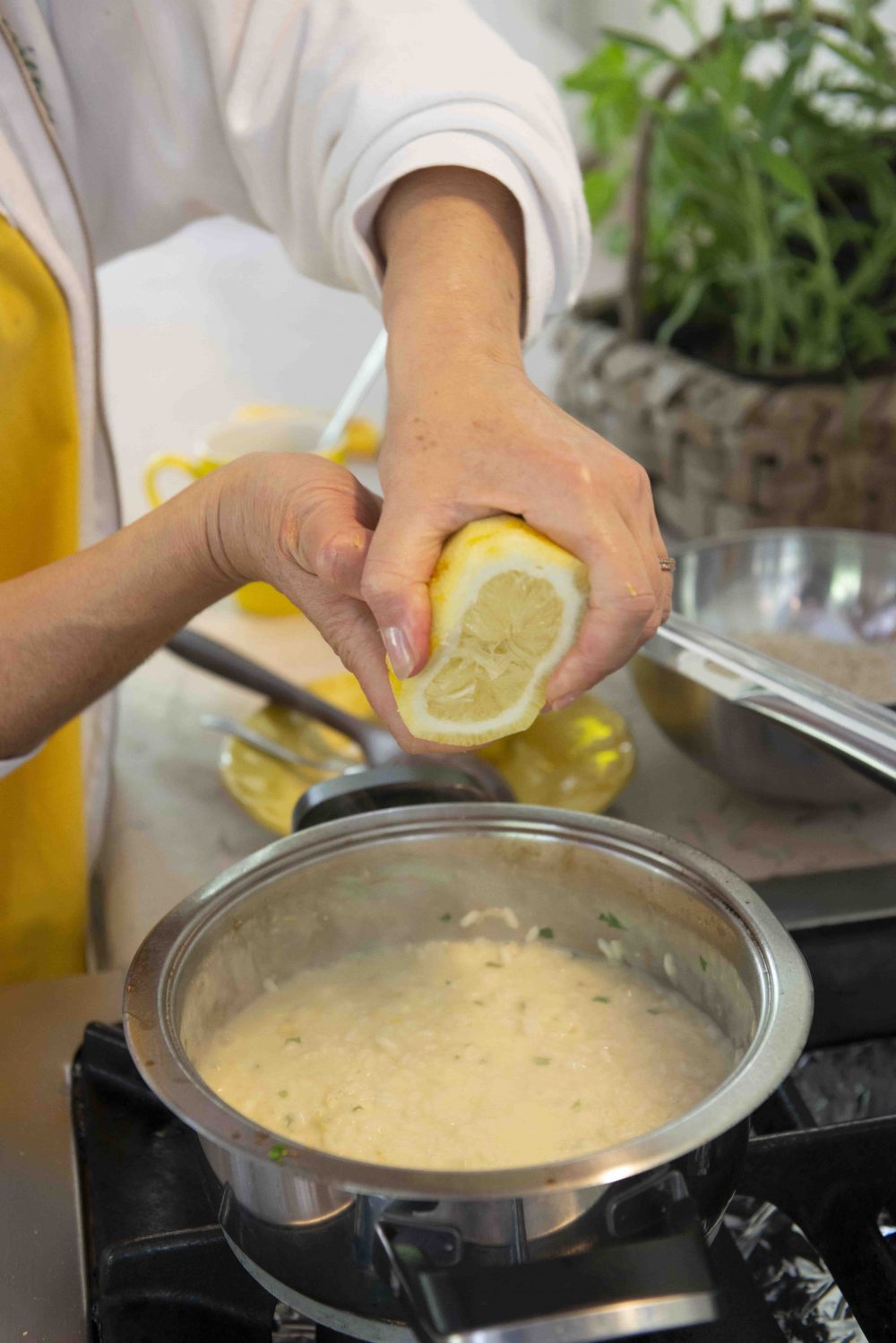
Lemon juice lightens an egg-thickened risotto.
She begins with spaghetti tossed with lemon pesto, a dish inspired by the classic basil-based pesto Genovese and one Giovanna feeds her family several times a month. But in this case, finely grated lemon zest—so much lemon zest!— stands in for the basil, creamy almonds take the place of pine nuts, and garlic—which might overwhelm the lemon—is simply left out.
The entire affair comes together in minutes, the pesto ingredients stirred together raw, waiting for the cooked pasta and a bit of its starchy water to be tossed and pull everything together. The result is phenomenal—al dente pasta with a sauce that hints at bright citrusy sweetness, yet remains decidedly savory. The lemon accents without overwhelming.
For the next dish, she makes the pasta itself fresh, kneading into it more of that vibrant lemon zest. Sometimes she even adds the lemon zest to the cooking water, yet another effortless way to pull more of the flavor into the finished dish. But it’s the simple sauce she makes next that I find so fascinating.
Working quickly with a knife, Giovanna trims away the white pith from the lemon she’d already denuded of its zest until she is left with a juicy oblong of citrus flesh. She trims the segments away from the membranes, flicking out any seeds, then chops it and mounds the flesh in a skillet. To that, she adds chopped garlic, olive oil, salt and nothing else.
More From the Amalfi Coast
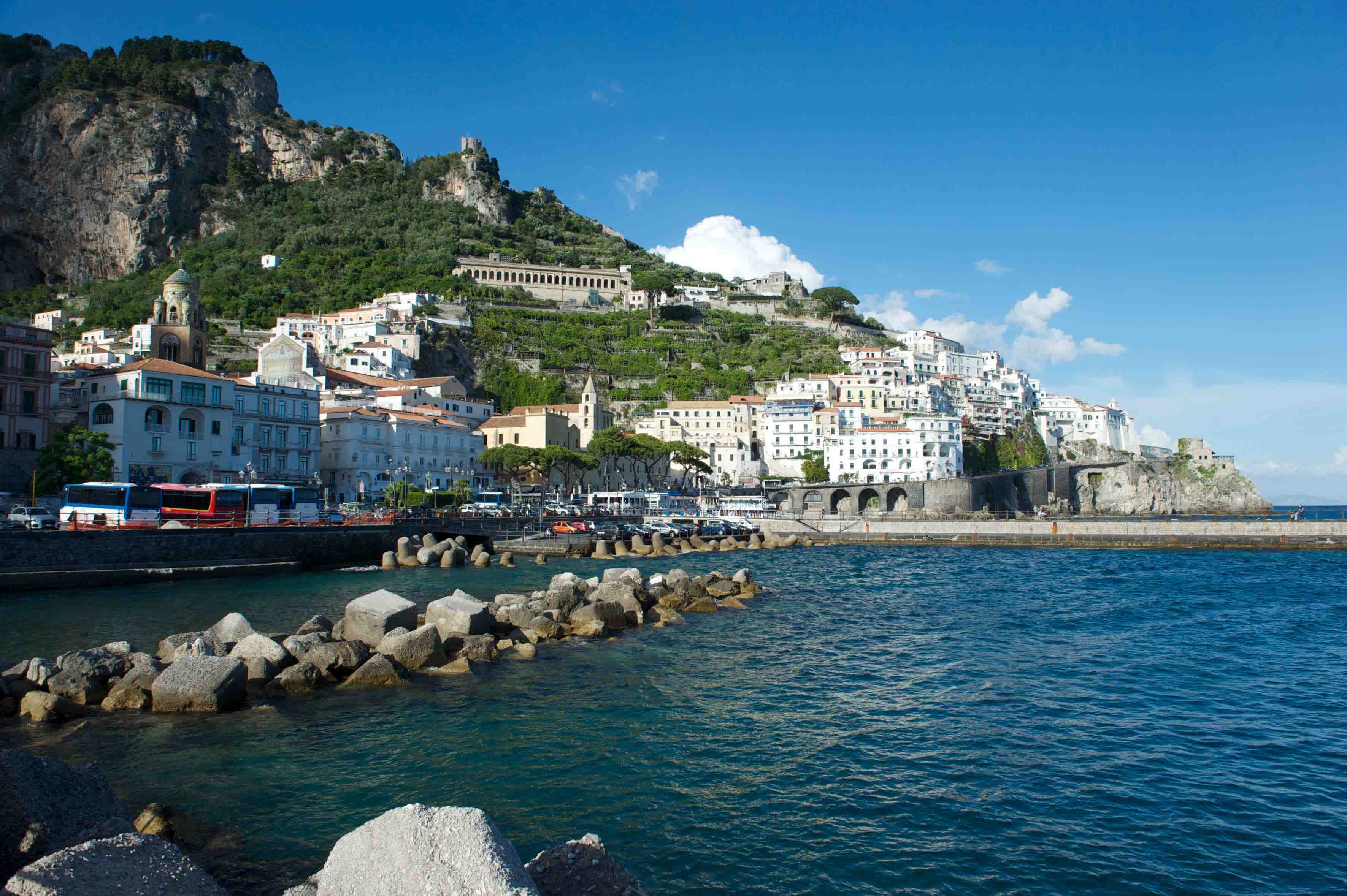
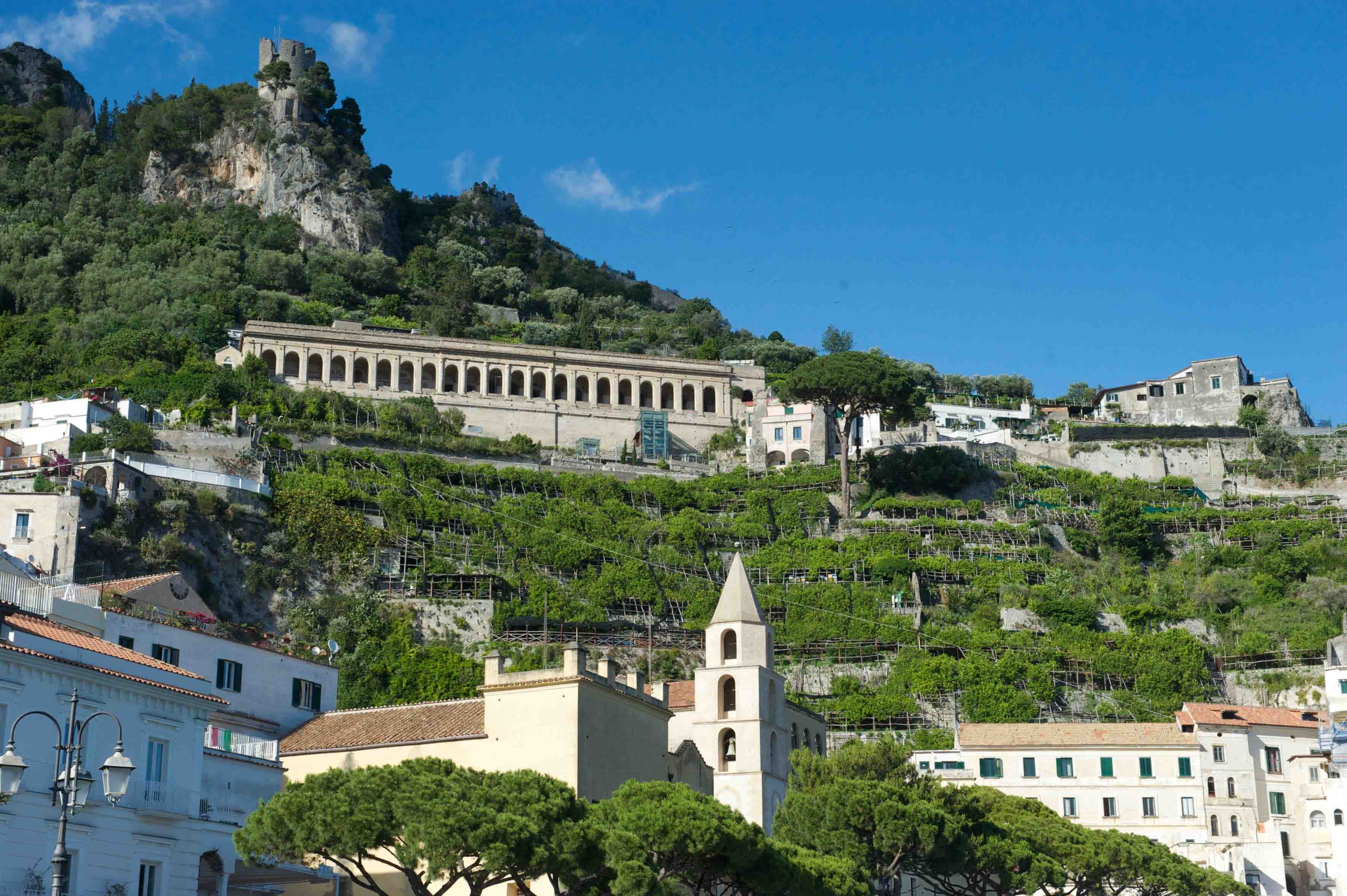
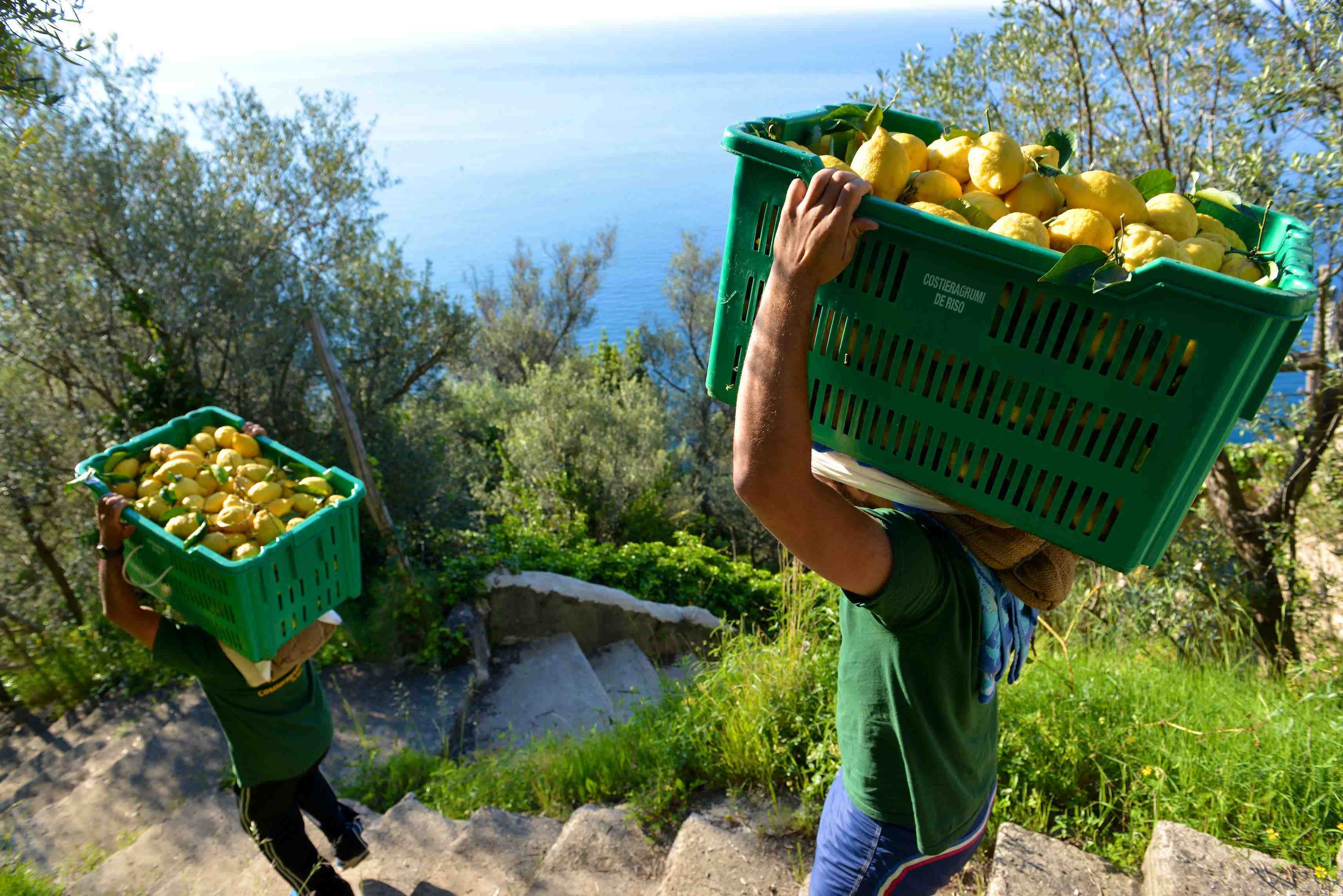
During harvest, workers perch 140-pound crates of lemons on their heads to carry down the hill.
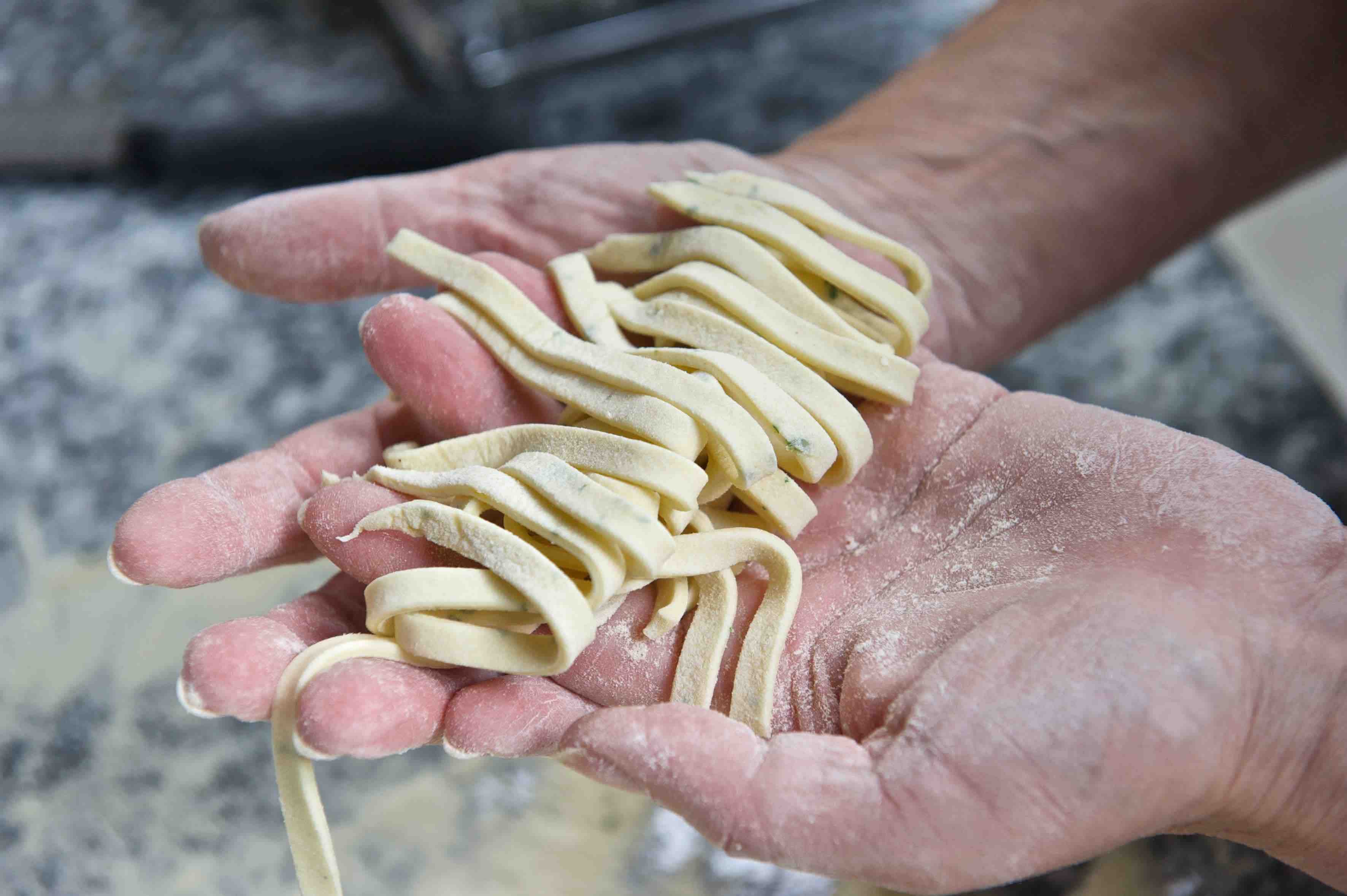
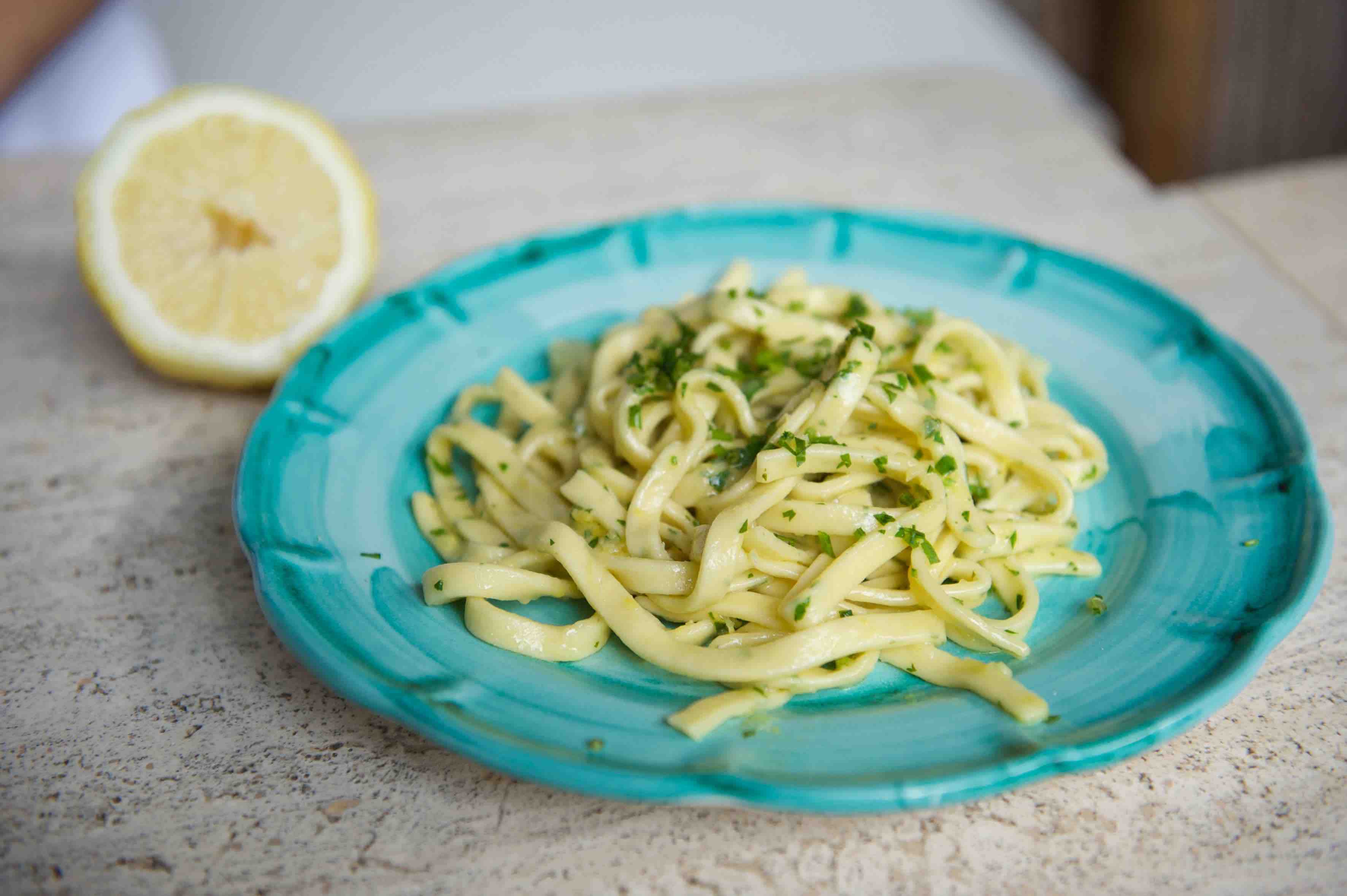
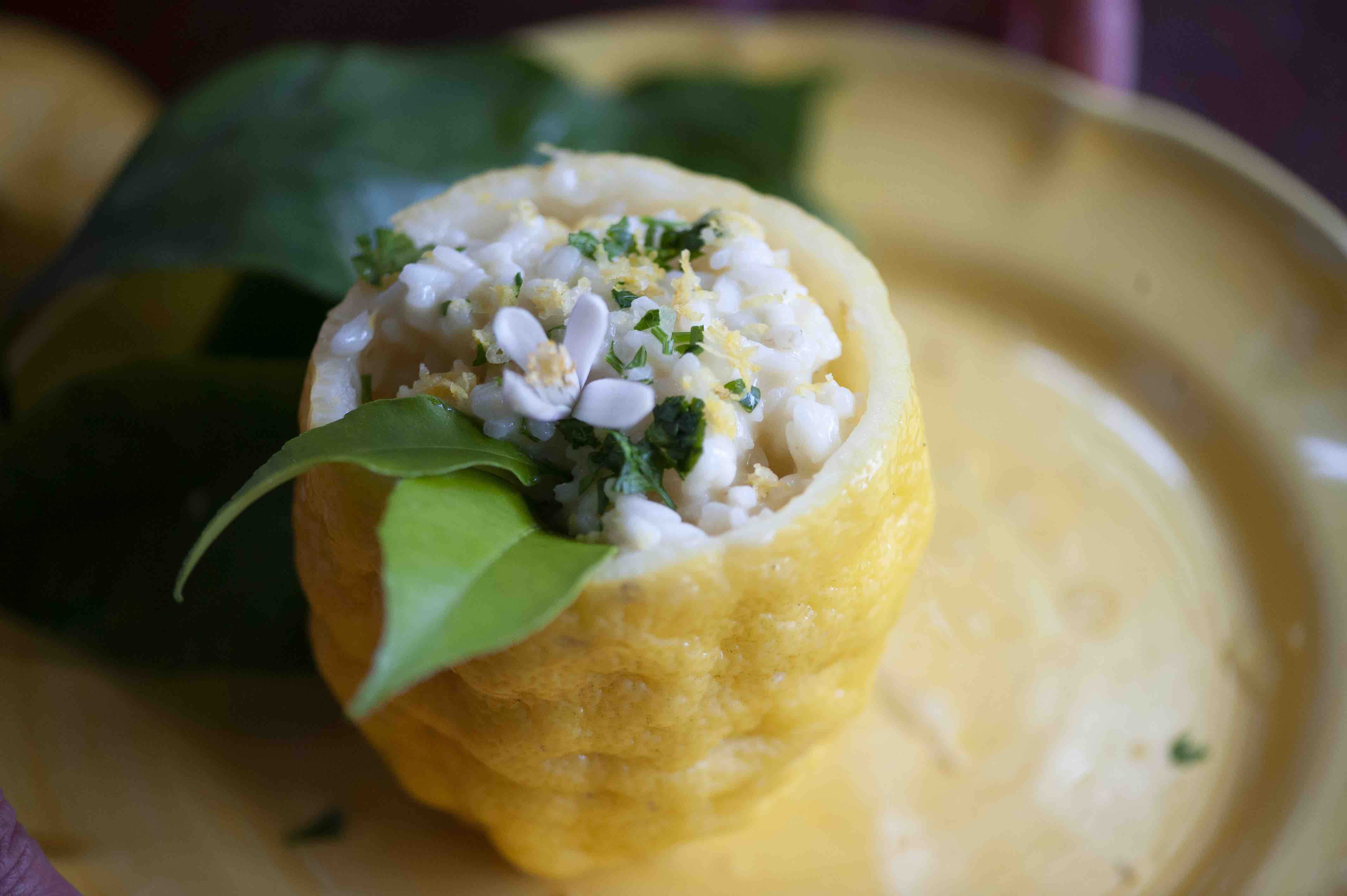
The pasta emerges tender and aromatic from boiling water in minutes, it and some of the water joining the ingredients in the pan. A bare minute over low heat—“We want to keep the flavors fresh as much as possible”—then she finishes it with yet more zest and a sprinkle of parsley. The result is amazing, creamy, light, fresh. The taste of sunshine.
Finally, Giovanna offers a risotto, but like none I’ve ever seen. The “broth” is salted water simmered with the zest of a whole lemon. As it simmers, she lightly browns an onion in olive oil before adding the rice, giving it all a vigorous stir. She listens for the rice to start popping, the sign that it is ready for a splash of white wine. She knows how much to add without measuring. “Quanto basta,” she says, waving at me. When it’s enough.
She ladles in the golden broth. When the starches turn creamy, her next step throws me. I expect cheese, unctuously savory. Instead, she stirs together an egg yolk, a couple tablespoons of heavy cream, some chopped parsley and the zest of yet another oversized Amalfi lemon. After stirring the mixture into the risotto, now intensely yellow, she adds the juice of the lemon. The result is three layers of lemon flavor—the infused broth, the zest and the juice.
As Giovanna spoons the mixture into the skins of lemons hollowed to form serving cups, she tells me about an alternative version she enjoys, adding plump shrimp just at the end of cooking and using their shells to further infuse the lemony broth. The finished risotto is creamy and rich, but without cheese, and thanks to the lemon, it remains light, fresh and sweet.
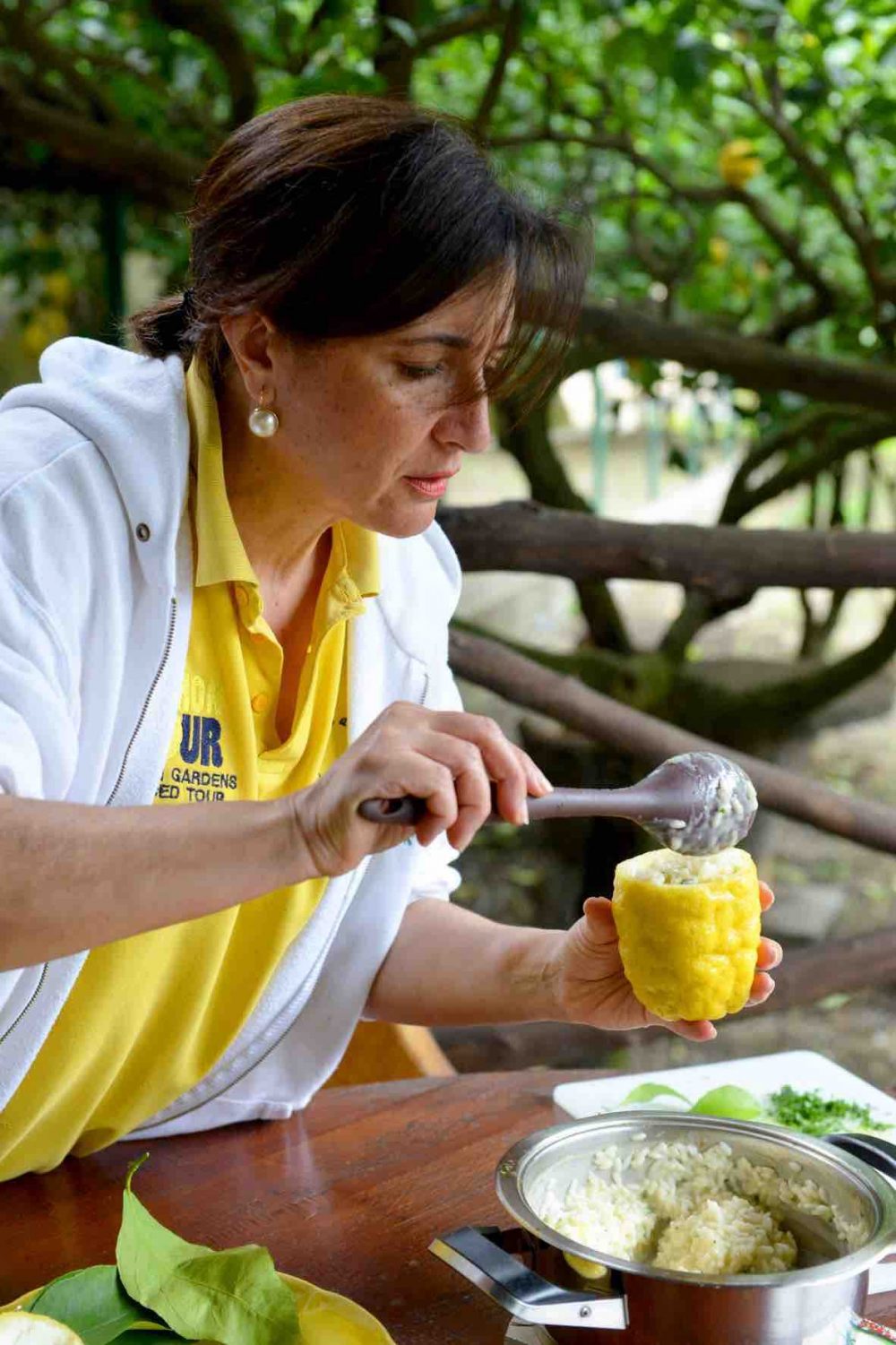
Salvatore wastes little time eating each dish as quickly as Giovanna serves is. He considers the lemons. That he eats. That hang above his head. That dictate his every day. Here, they are a part of everything in ways that cannot be teased apart.
“If we abandon (the farm), you don’t just create problems for our family. You create a disaster for the community. Everything falls down. We have houses, a church and people. They all rely on lemons. I have to stay here. I don’t have a choice,” he says. And he seems pleased to do so.
